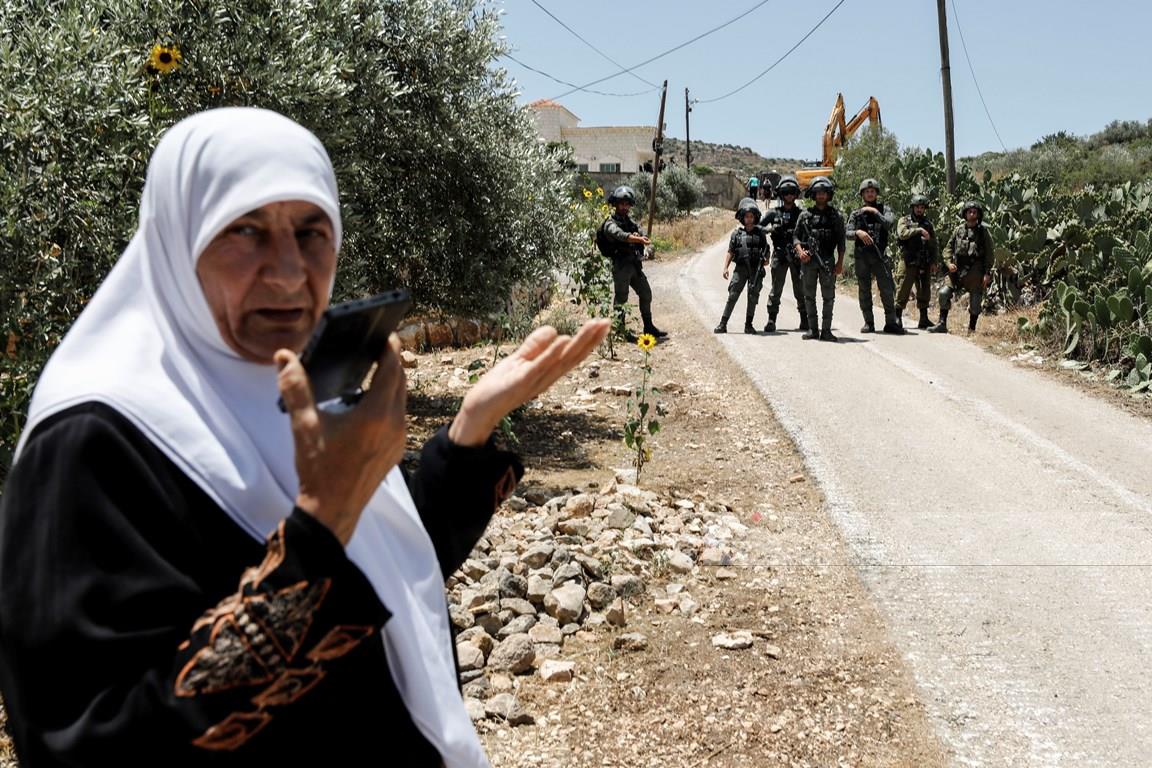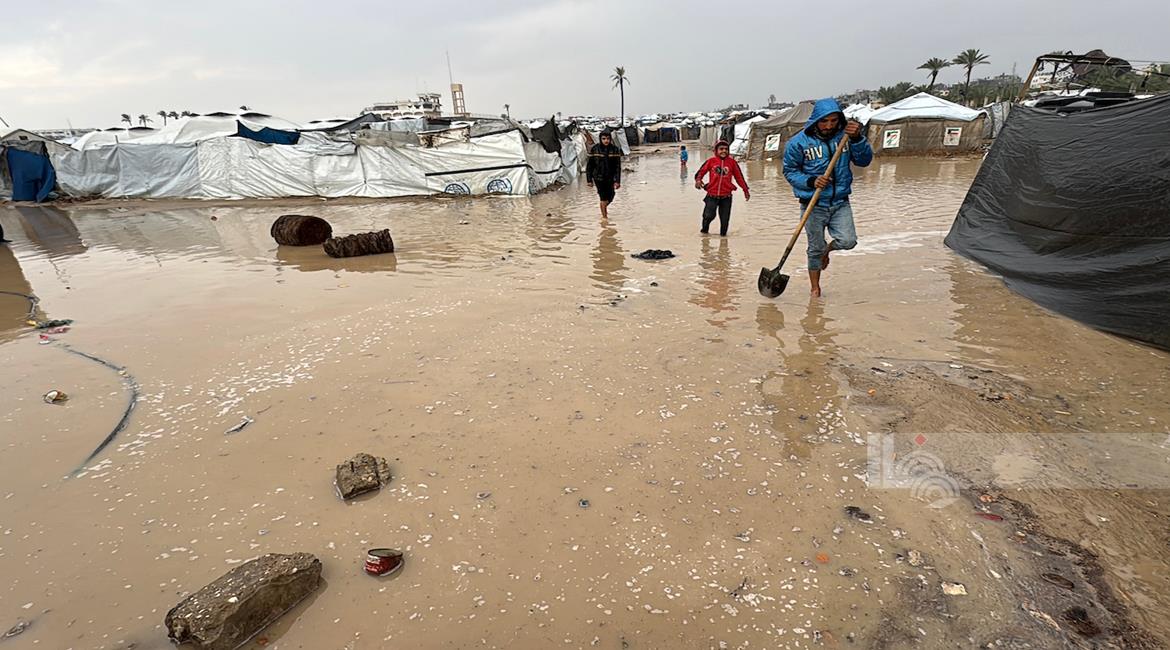By: Maha Al-Shaikh
RAMALLAH, Sunday, July 28, 2024 (WAFA) - Taghreed Abu Tein, a Palestinian resident of the village of Al-Walaja; located 10 km south of the occupied city of Jerusalem, sits inside a tent she had set up six months ago on the rubble of her house which was demolished by the Israeli occupation bulldozers in mid-July.
Abu Tein said the Israeli military launched a surprise raid into their home, accompanied by four bulldozers, without any prior notice. According to Abu Tein, the bulldozers proceeded to demolish the house without allowing the family to remove the furniture, amidst the firing of tear gas bombs and stun grenades at the residents who attempted to approach the area to find out what was happening.
Abu Tein spoke about the hardship of living in a tent that was placed on the rubble of what she said was her “dream house” which she managed to build after 25 years of hard work and toil, stating that under the pretext of building without a permit, a lifetime of hard work was lost in just a few hours.
Since the start of the Israeli aggression on the Gaza Strip on October 7, 2023, the demolition of Palestinian homes in the West Bank has significantly increased; 318 Palestinian-owned homes and structures were demolished in the first half of 2024; which is equivalent to the total number of homes that were demolished during 2023.
According to the Colonization and Wall Resistance Commission, most of the demolitions took place in Jerusalem.
Since the beginning of 2024, the occupation authorities issued over 359 notices ordering to demolish, halt construction on, or evacuate structures.
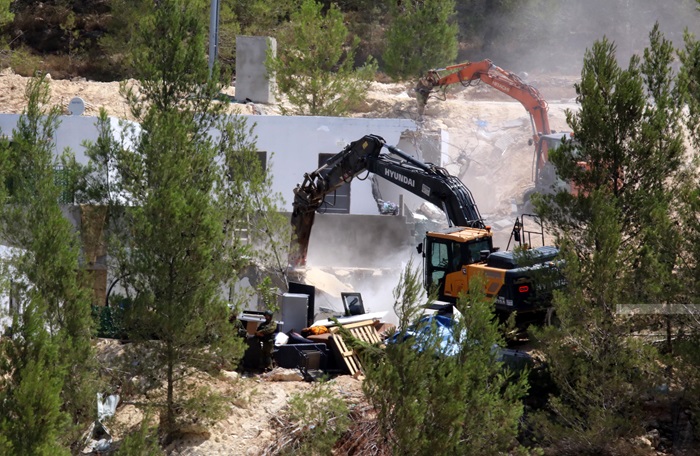
The situation was not much different for Reem Issa, a resident of the town of Anata northeast of occupied Jerusalem, whose house was demolished by the occupation authorities in the middle of this month. Issa said: "The occupation demolishes your home before your eyes in an instant. You feel knives cutting deep into your heart watching a lifetime achievement being destroyed.
She stressed that they did not receive any prior notifications before the demolition, adding that Israeli forces blew up the house's front door and prevented the family from taking anything out of the house.
The Israeli occupation demolishes Palestinian residents’ homes under the pretext of building without a permit, particularly in areas classified under the Oslo Accords as Area "C" of the West Bank, which make up approximately 61% of the West Bank.
In addition, Israel also cites “security requirements” as a pretext for the demolitions.
The occupation authorities also demolish the homes of prisoners and slain Palestinians who are accused of carrying out attacks on Israelis as a form of collective punishment against their families.
According to the Executive Director of the Treatment and Rehabilitation Center for Victims of Torture, Khader Rasras, the demolition operations have significant psychological effects on Palestinian families, particularly women, as losing their homes deprives them of their personal space where they feel freedom, stability and security.
Rasras stressed that shelter, food and water are the most basic human survival needs and when a home is lost, the basic elements of survival are also lost.
He stressed that women are the most affected by home demolitions, as they spend more time at home. He explained that every space in the household means more to women; starting from the kitchen and bedrooms to the living room where they host friends and family.
He stressed that house demolitions are a privacy violation, adding that a house is a form of shelter, and once it is lost, a person loses their sense of security and protection.
According to Rasras, a home represents the sum of a person's memories, and its destruction means the loss of the beautiful memories that existed in a person's life, stressing that any harm done to the home affects the overall well-being of a person.
Specialist in women's issues, Nahed Abu Taima, explained that losing one's home has an emotional dimension. “When you lose your home, you lose a part of your soul. Women lose their kingdom; where they raised their children and filled it with many details and memories.”
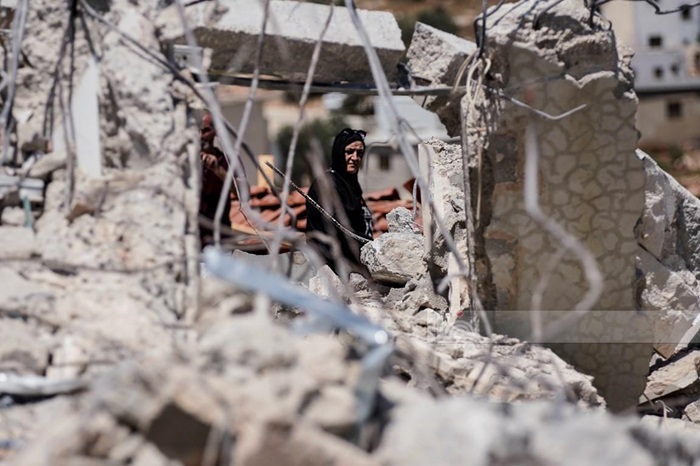
She said: "When people lose their homes, they lose details and memories and big parts of their souls die.”
A fact sheet prepared by the Women's Centre for Legal Aid and Counselling indicated that women bear a double burden when the family's land and livelihood are seized, or when the family's home is demolished, noting that women don’t just lose their right to shelter, but also lose psychosocial stability as the burden of providing their families that were left homeless with care and support increases.
Meanwhile, Ilham Sami, from the Annajda Society for the Development of Palestinian Women, said: ”For a woman, home is part of her essence and constitutes a safe environment for her. “Therefore, the destruction of the home undermines security and safety.”
She added: "The destruction of home hurts and affects the woman because she is accustomed to a certain household routine. When the home is destroyed, all this system changes.”
Tackling what can be offered to women who lose their homes, she emphasized the need to work at an international level to advocate for women and pressure international organizations to force the occupation to stop the policy of house demolitions.
She further emphasized the need to mobilize direct support for women through feminist institutions and competent authorities by providing them with psychological and material support that helps them stand up again, in addition to providing crafts courses to empower them economically.
She further underscored the importance of making women’s voices heard through the media and allowing them to tell their stories.
Consultant psychiatrist and head of the mental health unit at the Palestinian Ministry of Health, Samah Jabr, said the demolition of a house has a profound psychological impact on all family members; being the space where the family's story unfolds, stressing the enormous efforts that Palestinian families have to make to acquire a house.
She added that the demolition of a house does not only constitute a great material loss but also a great psychological loss, especially for women, who are clearly affected and have to contain the whole family while at the same time trying to conceal their pain to comfort the husband and contain the fear and shock of the children resulting from their shattered memories.
She affirmed that all psychological interventions are available to anyone who needs them, explaining that some individuals develop anxiety and depression that start from the very first day the demolition order is issued, specifically when the occupation authorities force residents to demolish their own houses.
It's not only about the home being demolished by the occupation bulldozers, but it’s also about the occupation authorities' approach of forcing Jerusalemite residents to self-demolish their homes in fear of paying exorbitant costs to the Israeli municipality if it carries out the demolition. This applies to the case of 83-year-old Latifha al-Wahidi, who was forced to demolish her own house in the East Jerusalem town of Silwan during the middle of this month.
The elderly woman, al-Wahidi, explained that she lost her 120-square-meter house, where she had lived with her six grandchildren since 2008, rendering the family homeless in search of a house to rent.
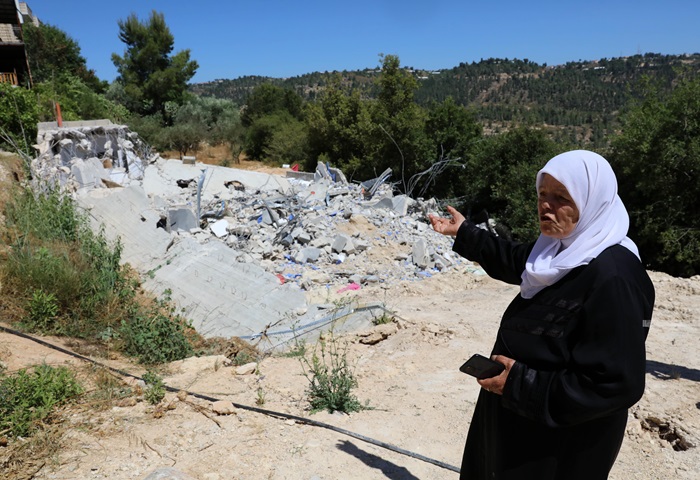
A report published by the Colonization and Wall Resistance Commission showed that during the first half of 2024, the occupation carried out 243 demolition operations against 318 different facilities in various West Bank governorates.
The report said that 28 facilities were demolished in Jericho and the Jordan Valley, 66 in Hebron, 31 in Bethlehem, 34 in Jenin, 10 in Ramallah and al-Berah, and three in Salfit, in addition to 21 structures in Tulkarem, 16 in Qalqilya and 24 in Nablus. In Jerusalem, 85 structures were demolished.
In total, 137 inhabited dwellings, 36 uninhabited dwellings, 63 livelihoods, 61 agricultural facilities and 21 other facilities were demolished, bringing the total number of demolished facilities to 318 compared to 313 structures that were demolished in 2023, which indicates an unprecedented escalation.
According to official data, the ongoing Israeli aggression on the Gaza Strip for over nine months has so far resulted in the destruction and damage of 60% of residential units. Specifically, 138,000 residential units have been completely destroyed, and 453,000 units have become uninhabitable, in addition to the unprecedented damage inflicted upon schools, universities, hospitals, mosques, churches and infrastructure.
T.R.




